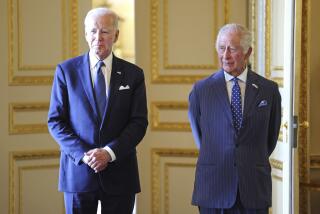Reagan, Thatcher Meet; She Lauds His ‘Total Integrity’
- Share via
WASHINGTON — President Reagan, whose approval of arms shipments to Iran has upset some allied leaders, received a vote of confidence Saturday from British Prime Minister Margaret Thatcher after the two leaders met privately at the Camp David presidential retreat.
Thatcher, at a news conference following her nearly three-hour meeting with Reagan, staunchly refused to join the growing chorus of critics who view the arms transfer as a betrayal of those allies who support U.S. policy against dealing with countries that support terrorism.
“I believe implicitly in the President’s total integrity on that subject,” she said.
She also declined to divulge what she told Reagan privately on the subject and instead expressed her gratitude to the United States for taking “swift and decisive action” to impose economic sanctions on Syria for its attempted bombing of an Israeli airliner at Heathrow Airport last April 17.
Won’t Deal With Iran
At the same time, the British prime minister emphasized that she has no intention of dealing with Iran, which has Syria’s support in the Iran-Iraq War. She said her country continues to remain neutral in the war and adheres to a policy against selling any “lethal weapons” to either side in that conflict.
In the past, Thatcher has been hurt politically at home by her willingness to support Reagan-- particularly her decision to allow the United States to use American bases in Britain to launch a bombing attack on Libya last April. British opposition leader Denis Healey has called Reagan’s speech explaining the U.S.-Iranian arms deal “stupefyingly incredible.”
Reagan made no statement after the meeting with Thatcher, but a U.S. official who declined to be identified said “it was not a tense meeting” despite their obvious differences on some issues. According to the official, the two leaders had agreed “they are not going to be paying ransom” to hostage-takers--a reference to the charge that arms for Iran were intended to buy the freedom of Americans held in Lebanon.
No One Else in Room
There were no aides or note-takers in the room when Iran was discussed, according to the U.S. official, and thus the only two people who know precisely what words were exchanged between them on the subject are Thatcher and Reagan themselves.
In his weekly radio address Saturday, the President made no mention of Iran but instead asserted that he and the Congress are making progress toward a bipartisan approach to national security issues. This prompted Sen. Patrick J. Leahy (D-Vt.), in his response for the Democrats, to remark that the Iranian arms deal has undermined any such consensus.
“Now we must pick up the pieces,” Leahy said. “A bipartisan counterterrorism policy must be built. . . . All this is going to be extraordinarily difficult after the events of the last week.
‘We’d Better Brace Ourselves’
“Until our anti-terrorism policy is restored,” Leahy added, “we’d better brace ourselves for new terrorist outrages.”
The Camp David meeting was the first face-to-face encounter between Reagan and Thatcher since the U.S.-Soviet summit meeting in Iceland last month, and the President took the opportunity to assure her that the superpowers will first seek to remove medium-range missiles from Europe before they tackle more difficult issues such as the elimination of all ballistic missiles.
In a statement that was approved by U.S. officials, Thatcher said they agreed that medium-range missiles would take precedence in the arms control negotiations, followed by a 50% reduction in strategic missiles and a proposed ban on chemical weapons. She expressed the hope that the European missiles could be “decoupled” from the discussion of strategic weapons, which are snagged on Reagan’s refusal to surrender his Strategic Defense Initiative, the space-based missile defense system known as “Star Wars.”
Still Backs ‘Star Wars’
Thatcher reiterated her support for continued “Star Wars” research, saying it should be pursued up to the point of “feasibility.” But she declined to specify whether she was endorsing the testing of such devices, which the Soviets contend are barred by the 1972 Anti-Ballistic Missile Treaty.
She indicated that Reagan told her that any U.S.-Soviet arms agreement would not affect Britain’s independent nuclear forces--including the new Trident submarine--and that any cuts in nuclear arms would be balanced by reductions in Soviet conventional forces.
Britain and France have insisted that their own nuclear forces be excluded from any superpower agreement.
More to Read
Sign up for Essential California
The most important California stories and recommendations in your inbox every morning.
You may occasionally receive promotional content from the Los Angeles Times.










